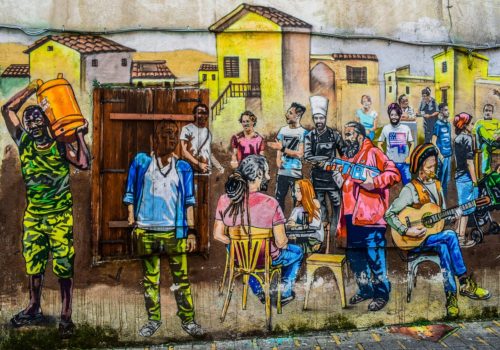Download PDF: Morris, In Search of Community
Abstract
Outside the familiar walls of churches, we young people often struggle to express our faith in relationships with peers. Even with my fellow Presbyterian college roommate, I struggle to articulate my faith; we are particularly unsure how to engage one another when we disagree theologically, as the following personal narrative shows. After many missteps, I’ve learned that I am called witness to the gospel I do know, rather than feel confounded and be silenced by the mysteries I do not. Our disagreements have brought my roommate and I closer to each other and to an awareness of our own incomplete knowledge. We’ve come to understand that we’re not in each other’s lives to “convert” one another, but to offer loving community on our common journey.
I’m not one to say that God has a plan for my life, but sometimes life wallops me with someone I know has to be a gift from God.
I’ll always remember the first time I met her. Move-in day for the Class of 2012: August 22, 2008. A day when I could not decide whether I wanted to jump for joy or lose my breakfast. I was carrying a hamper full of linens – my brand new comforter, sheets, blanket, pillowcases, and towels – and walking into my room for the first time. Pretty soon, the dank hall and its inhabitants would become all too familiar, but right then the raw newness overwhelmed me. I had counted down the days for months, but right there on the threshold of my new home, I had to admit that I was scared to death.
Despite the completely unfamiliar setting, I was really only waiting to meet Ruth (name changed to protect the incredibly awesome), my new roommate. As I entered my room, I caught sight of her immediately. She had pulled her long golden hair into an untidy ponytail, revealing the shiny hoops dangling from her ears. Like the needle of a compass, Ruth stood confidently in the center of our room, petite at five feet three inches. Grey-eyed like the goddess Athena. Wearing a T-shirt with a giraffe on the front and boy-shorts almost reaching her knees. Maybe Athena turned field biologist or something?
Ruth turned and saw me, and she smiled. And for me, at least, that smile made history. Starting that very first day, I had a best friend. We encountered each other as we were: two girls caught between childhood and adulthood, needing hospitality on the journey.
I admired Ruth from the get go. She stood out from the multitudes of freshmen like a dragonfly in an ant colony. She was that girl – the one who ran barefoot, who walked barefoot to class. I joined my classmates in staring at her until I realized that her eccentricity allowed me to unleash my own.
Our eccentricities coalesced, and we developed our own rituals within the first week. Ruth whistled hymns on the way to breakfast. Summoning my virtually nonexistent musical talent, I quietly added my faltering hum to her more melodious whistle. If passersby listened closely, “Morning Has Broken” and “A Mighty Fortress is Our God” serenaded them at 7:30 AM (probably not a welcome experience for most).
Our most mysterious ritual developed from our faith, as well. Almost jokingly, we started applying the term “pilgrimage” to our random expeditions together. One night, as I was complaining loudly about my massive amounts of math homework, Ruth sprang up.
“I know! Let’s go on an adventure!” She grabbed her flashlight and her Bible (only Ruth would think to bring her Bible on an adventure) and waited impatiently while I put on my shoes.
We walked all the way to the amphitheater, the site Ruth chose for its wide-open view of the sky. We huddled together in the damp grass, arms wrapped around each other’s shoulders for protection against the chill evening air.
“Look at the stars,” she whispered. “There’s Orion – see the stars in his belt?” And then, “Shall we read Scripture to each other?”
“Yeah,” I whispered back, shivering now not from the cold, but from the holiness of the time and space.
“In the beginning was the Word, and the Word was with God, and the Word was God…”1
And so our friendship began.
We did not discover that we had any theological differences for quite a while. Our shared denomination, Presbyterian, hid differences that ran deep, differences that we had to work through. At first, we each reacted strongly and vocally to one another, unable to meet with any vulnerability or grace the challenges the other posed.
“Jesus is the way, the truth, and the light.”2 Other religions are the work of Satan. I’m sorry, but as long as you believe what you do about universal salvation,3 you don’t have a connection to Jesus,” Ruth told me.
I had pretty strong responses in store for her as well. Defending my belief in universal salvation as Jesus’ resurrection story, I said something like,
“I believe that God is love. That’s all there is to it. I don’t see how you can say you worship a loving God when according to you practically everybody who isn’t just like you is going straight to hell. I just don’t understand how you can say that.”
Both Ruth and I were sure we could recruit the other for our own camp. But both of us are strong-minded women, confident in our belief systems – or at least we thought we were. Trying to convince Ruth of universal salvation is like trying to poke a hole in our concrete dorm room wall with a feather. And trying to convince me that God sends anybody to hell is like trying to get a snail to win the Olympic hundred-meter sprint. In other words, just not happening.
Gradually, though, our disagreements have birthed a stronger friendship. While we still strongly disagree, we have learned to do so respectfully and vulnerably. Now, our discussions often stem from honest questions reflecting our own struggles. Underneath our outright rejection of one another’s theologies lay a lot of questions and insecurities. I clearly remember the first time Ruth admitted she “didn’t have everything together.”
“God doesn’t talk to me,” she confessed. “I’ve been searching, but I haven’t found God. I want to hear [God’s] voice, just once.”
I didn’t know what to say. I have never heard God’s voice in a literally audible way, either. But an answer I could not easily articulate drifted beneath my conscious mind. If I had another chance to answer Ruth, I might say,
“God is speaking to you. Every minute of every day, God is speaking to you. You feel the breeze tickle your face and water slake your thirst. You receive love from so many people. You find the strength in yourself to try again, to reach out, to say, “˜I’m sorry.’ God is speaking in you, through you, and around you.”
But right then, my admission of my own uncertainty was the response our relationship needed. From that point forward, we each started to admit that “we know only in part, and we prophecy only in part.”4 We still only “see in a mirror, dimly,” but slowly, we are beginning to recognize the light we can cast on one another’s glass.5 I push Ruth to think about what God’s love for humanity means. Ruth pushes me to take seriously sin and evil in the world and to recognize and reconsider my highly selective reading of the Bible. In a way, we are back to where we started – welcoming each other into our lives just as we are, recognizing that we are both broken but blessed travelers on the journey. Our acceptance of each other is more complete now, because we really know who we are welcoming.
Our pilgrimage together is still unfolding. I could have no better companion on my journey right now. Each day, millimeter by millimeter, we scoot closer to the unconditional love of each other to which God calls us. Every time I think we are just about there, the sky opens up and shows me that even more light lies ahead.
When we first heard the rumbles of thunder, we both knew that one of us would suggest it sooner or later. For a while, both of us forgot what our parents and other responsible adults had told us about going outside during thunderstorms. But if I have learned one thing from my roommate, it is that the elements are meant to be experienced body and soul. So Ruth and I pulled on our raincoats. Giggling giddily, we slipped out of the dorm just as multitudes of shrieking girls piled in, fleeing the torrential rain.
The storm seemed to register our presence as soon as we left the shelter of the dorm. The rain increased its tempo until we felt as if small hammers were besieging our heads. The water sloshed around our feet, and within seconds we were so saturated we thought water would come dripping from our ears next. But we stood still in the field and looked up at the sky. Time and time again, lightning split the heavens in half, rending the dark curtain separating life from the life to come, complacency from conversion, two little girls from their Maker. The thunder crashed around us like the world was coming to an end. And we, Ruth and I, were there to see and hear.
Spontaneously, we began to hum, then sing: “I see the stars, I hear the rolling thunder, Thy power throughout the universal displayed; Then sings my soul, my Savior God, to Thee, How great Thou art, How great Thou art!”6
Ruth and I stood there in the field for a long time, our bodies shivering side by side as the water poured off of us. The wind blew our hoods away from our faces, and the rain baptized us with a spirit of courage and freedom. We yelled and hollered at the sky, and I knew then that we were praying. Our wordless prayer rose to the heavens, a prayer we could not and would not fetter with words. We knew that the whole of our broken presence was enough for God. We knew beyond a shadow of a doubt that anything great enough to make the thunderstorm was strong enough to bear the weight of our questions. We knew that we were tiny boats at sea in a great big universe, but that we were not lost. We knew those things together in silence.
Ruth, the poet, whispered, “I wish I had something profound and poetic to say about this.”
I responded, “I think the sky is writing the poetry for you tonight.”
Slowly, the storm subsided. Ruth and I waited as the rain, thunder, and lightning ran their course. Our thoughts returned to our warm dorm room where tea and dry clothes awaited us. But we each knew that we went home changed, brought closer to the majesty and mystery of God revealed in the storm – and in ourselves.
Ruth spoke first. “I’m so glad we’re roommates. I can’t imagine this part of my life any other way.” And then, “Really amazing stuff like this must happen every day. But usually we’re not paying attention, so we miss it.”
I wondered then at the tragedy of what I have missed, and at the gift of being alive to share the storm with God and my best friend. Somehow on that night we approached together the knowledge that God’s mystery is grander than anything we can possibly imagine. Ruth and I have our own theories to which we cling fervently, but at the end of the day, we do not know the truth about God or even about ourselves. We do have a morsel of clarity, though: We know that we have encountered something good, something holy, something welcoming in each other.
So we walk together as fellow travelers. We reach across the gaps that threaten to divide us with the assurance that God is great enough to hold us together. And through grace I cannot understand, our friendship challenges me to follow Jesus down roads I haven’t walked before. Maybe one day our paths will diverge as we respond to different tones of the same Caller. But for today, we offer each other the bread and cup of community – a rare blessing indeed.
Feature Image by Greg Raines. CC Zero license.
Notes
- Jn 1:1, New Revised Standard Version
- Jn 14: 6, NRSV
- By universal salvation, I mean to convey my belief in Christ’s ultimate triumph over all sin and death in the world, which draws all humanity into relationship with God regardless of adherence to any particular set of beliefs.
- 1 Cor 13:9, NRSV
- 1 Cor 13:12, NRSV
- Boberg, Carl Gustav. “How Great Thou Art,” in Hymns, Psalms, and Spiritual Psalms, ed. by John Ribble et al. (Louisville: Westminster/John Knox Press, 1990), hymn number 467.





